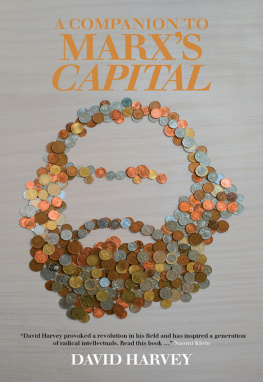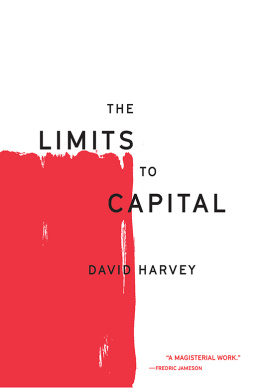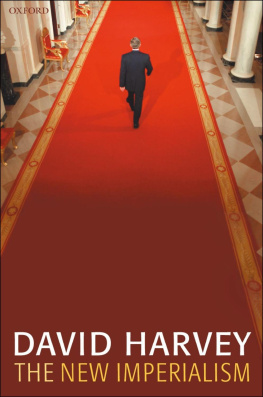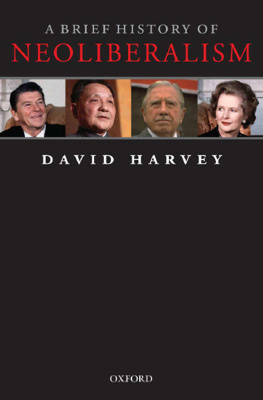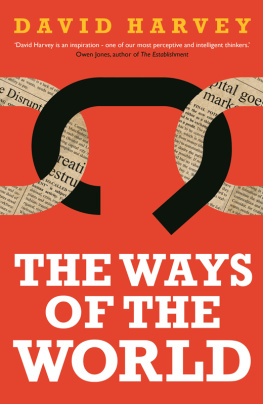Harvey David - The New Imperialism
Here you can read online Harvey David - The New Imperialism full text of the book (entire story) in english for free. Download pdf and epub, get meaning, cover and reviews about this ebook. year: 2003, publisher: Oxford University Press, Incorporated, genre: Politics. Description of the work, (preface) as well as reviews are available. Best literature library LitArk.com created for fans of good reading and offers a wide selection of genres:
Romance novel
Science fiction
Adventure
Detective
Science
History
Home and family
Prose
Art
Politics
Computer
Non-fiction
Religion
Business
Children
Humor
Choose a favorite category and find really read worthwhile books. Enjoy immersion in the world of imagination, feel the emotions of the characters or learn something new for yourself, make an fascinating discovery.

- Book:The New Imperialism
- Author:
- Publisher:Oxford University Press, Incorporated
- Genre:
- Year:2003
- Rating:3 / 5
- Favourites:Add to favourites
- Your mark:
- 60
- 1
- 2
- 3
- 4
- 5
The New Imperialism: summary, description and annotation
We offer to read an annotation, description, summary or preface (depends on what the author of the book "The New Imperialism" wrote himself). If you haven't found the necessary information about the book — write in the comments, we will try to find it.
The New Imperialism — read online for free the complete book (whole text) full work
Below is the text of the book, divided by pages. System saving the place of the last page read, allows you to conveniently read the book "The New Imperialism" online for free, without having to search again every time where you left off. Put a bookmark, and you can go to the page where you finished reading at any time.
Font size:
Interval:
Bookmark:
The New Imperialism
David Harvey


Great Clarendon Street, Oxford OX2 6DP
Oxford University Press is a department of the University of Oxford.
It furthers the Universitys objective of excellence in research, scholarship,
and education by publishing worldwide in
Oxford New York
Auckland Bangkok Buenos Aires Cape Town Chennai
Dar es Salaam Delhi Hong Kong Istanbul Karachi Kolkata
Kuala Lumpur Madrid Melbourne Mexico City Mumbai Nairobi
So Paulo Shanghai Taipei Tokyo Toronto
Oxford is a registered trade mark of Oxford University Press
in the UK and in certain other countries
Published in the United States
by Oxford University Press Inc., New York
David Harvey 2003
Preface to paperback and Afterword David Harvey 2005
moral rights of the author have been asserted
Database right Oxford University Press (maker)
First published 2003
First issued as paperback 2005
All rights reserved. No part of this publication may be reproduced,
stored in a retrieval system, or transmitted, in any form or by any means,
without the prior permission in writing of Oxford University Press,
or as expressly permitted by law, or under terms agreed with the appropriate
reprographics rights organization. Enquiries concerning reproduction
outside the scope of the above should be sent to the Rights Department,
Oxford University Press, at the address above
You must not circulate this book in any other binding or cover
and you must impose this same condition on any acquirer
British Library Cataloguing in Publication Data
Data available
Library of Congress Cataloging in Publication Data
Data available
ISBN 0199278083
1 3 5 7 9 10 8 6 4 2
Typeset by Hope Services (Abingdon) Ltd.
Printed in Great Britain by
Clays Ltd., St Ives plc
On 15 February 2003 millions of people around the world participated in public demonstrations against the prospect of the US and Britain waging pre-emptive war against the sovereign nation of Iraq. It was an astonishing moment, perhaps the first occasion on which global public opinion found some sort of collective voice. I began writing The New Imperialism shortly before those demonstrations and finished before Baghdad was occupied in April. Events were swift-moving and there was much that was uncertain.
I set out, therefore, to identify the underlying forces at work within the chaos of surface appearances. I sought simple truths amidst the flood of propagandistic claims. To this end, I constructed a general framework for thinking that I hoped would be strong enough to survive the contingencies and uncertainties of actual outcomes. I here venture the claim, supported by what readers have told me, that the framework is both robust and useful. Readers canby constructing their own versions of how the relation between the territorial and capitalistic logics of power works; of the particular form of the US imperial tradition; of the innerouter dialectic of US society; of the role of predatory practice; of the distinctions between neo-liberal and neo-conservative politics; and of the strengths, strategies, and tactics of oppositional movementsarrive at their own particular interpretations and draw conclusions that may be quite different from mine. This is as it should be. There is much at stake in these times, and open debate is required to come to terms with where we stand and how we might best proceed.
The driving forces I identify are, furthermore, deeply enough entrenched to put in perspective the degree to which regime change in Washington, which could occur in January 2005, is able to achieve any radical change of course. The US ship of state, like one of those huge oceangoing tankers that brings all that oil to US shores, finds it very hard to change let alone reverse course even when, as I controversially claim, there is evidence it is headed for the rocks. There is a limit to what is possible within the intersecting force-fields of internal US politics, the US imperial tradition, and the political-economic dynamics of global capitalism. The existence of such limiting conditions is a matter that ought, as King Charles is said to have remarked on his way to the executioner, to concentrate the mind wonderfully. Unfortunately, far too many people prefer denial. I hope to go beyond polemics (no matter how excellently constructed) and engage in critical discussion of alternative political-economic futures given the multiple constraints that now exist. Judging by readers responses and the numerous foreign translations of The New Imperialism already scheduled, there are many people around the world ready for such a debate.
The Clarendon Lectures were delivered in the School of Geography and the Environment at Oxford University on 5, 6, and 7 February 2003. The timing is significant. War against Iraq, though seemingly imminent, had yet to begin and the faint hope still stirred that it could be stopped. That hope was bolstered by the huge global demonstrations, with a million or so people on the streets of London and Barcelona and impressive numbers recorded in many cities elsewhere throughout the world, including the United States, on 15 February. Sentiment within the Security Council of the United Nations largely supported the view that the threats posed by what everyone agreed was a barbaric and despotic regime could be resolved by diplomatic means. In spite of this opposition, military action against Iraq was initiated at the behest of the United States, supported most conspicuously by Britain and Spain, on 20 March. At the time of writing the outcome of the war, though not in doubt militarily, is still unclear. Will it end up being, or appearing to be, a colonial occupation, a US-imposed clientelist regime, or a genuine liberation?
On the one hand, these fast-moving events made it very difficult to devise a set of lectures on the topic of the new imperialism. But, on the other hand, the very nature of these events and the threats they posed economically, politically, and militarily to global security made some sort of in-depth analysis imperative. I therefore determined to try as best I could to penetrate beneath the surface flux to divine some of the deeper currents in the making of the worlds historical geography that might shed some light on why we have arrived at such a dangerous and difficult conjuncture.
In pursuance of that objective I gained much from sitting in on a year-long seminar organized on the topic of Imperialism by Neil Smith and Omar Dahbour in the Center for Place, Culture and Politics at the CUNY Graduate Center. I wish to acknowledge the help of Neil, Omar, and the participants in that seminar in shaping many of my insights. Several colleagues in the Anthropology Program at CUNY likewise commented freely on my topic, and I thank Louise Lennihan, Don Robotham, Ida Susser, Jane Schneider, Talal Assad, and particularly Michael Blim and the students who participated in our joint seminar on Land, Labor, and Capital for their input. The initial idea for some sort of intervention along the lines I here construct first vaguely occurred to me in a joint seminar I taught with Giovanni Arrighi at Johns Hopkins. I owe Giovanni a special debt. I am grateful to my colleagues in the Oxford School of Geography for the invitation to return to my old haunts and deliver these lectures at such an appropriate time and in such an appropriate place. I particularly want to thank Maria Kaika, Jack Langton, and Erik Swyngedouw for their warm welcome as well as for their intense interest in the topic. Anne Ashby of Oxford University Press proved most helpful and, as always, Jan Burke played her inestimable part in galvanizing me into action. Over the years I have gained much from interactions with others far too numerous to mention here. I hope I have put their individual and collective wisdom and understanding to good use in these lectures.
Next pageFont size:
Interval:
Bookmark:
Similar books «The New Imperialism»
Look at similar books to The New Imperialism. We have selected literature similar in name and meaning in the hope of providing readers with more options to find new, interesting, not yet read works.
Discussion, reviews of the book The New Imperialism and just readers' own opinions. Leave your comments, write what you think about the work, its meaning or the main characters. Specify what exactly you liked and what you didn't like, and why you think so.


